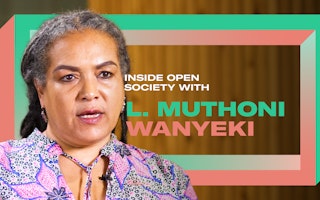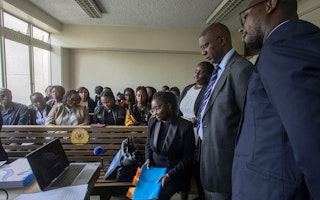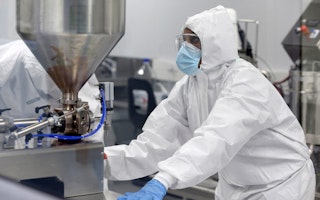President Johnson Sirleaf Backs Early Childhood Development in Liberia
By Tina Hyder

Being a child in Liberia today is not easy. The legacy of a brutal 14-year civil war and the slow re-establishment of law and order mean children in Liberia face a range of life-threatening challenges. UNICEF lists a series of startling facts on childhood in Liberia:
- Liberia’s infant and under-five mortality rates remain among the five highest in the world. More than 15 percent of children die before reaching their first birthday.
- Nearly 40 percent of children under age five suffer from stunting as a result of malnutrition.
- Armed conflict, HIV/AIDS, and other diseases have orphaned an estimated 230,000 children.
- Half a million children do not attend school. Two-thirds of students are being taught by unqualified teachers. Girls’ enrollment rates lag far behind those for boys.
Against this backdrop, the first Liberian early childhood development conference, held in Monrovia at the start of April, was an important step towards positive change. Hosted by the Liberian Ministry of Education’s Early Childhood Education Bureau, in cooperation with OMEP (an international early childhood organization), the event, supported by UNICEF and the Open Society Foundations, was attended by more than 500 delegates from Liberia, with some participants from neighboring countries and others from around the world.
In her opening remarks, president of Liberia Ellen Johnson Sirleaf stressed that “access to high-quality early childhood development is among the smartest investments for the future” and described children as Liberia’s “greatest natural resource.” She went on to say:
As government, we realize that we must work harmoniously with all partners to ensure access to early childhood education programs, to develop standardized and sustainable programs, and to build the capacities of early childhood education, in order to have a positive and favorable impact on the nation’s programs for children from birth through grade three. The programs shall aim to provide all necessary opportunities for each child to develop the appropriate physical, mental, emotional and social skills, attitudes, and habits to enable him or her to proceed to the primary level and continue to learn and live a useful and productive life.
The president also emphasized the need for cross-agency and cross-sector cooperation, pointing out that a child’s development includes not only education, but also health, nutrition, protection, gender, and future employment.
President Johnson Sirleaf is co-chair of the United Nations High-Level Panel on the post-2015 Millennium Development Goals, and in this role is aware of the critical importance of investment in children and young people as a means to ensuring a positive future.
Liberia is not alone in facing these challenges. Globally, according to the Lancet, 200 million young children are not reaching their full potential, and 165 million are stunted. The majority of these children live in sub-Saharan Africa. Greater access to effective early childhood development services can tackle early inequities and boost social and economic development. There is a significant body of evidence which testifies that investment in high-quality services for young children and their families improves health and education outcomes, narrows inequality gaps, and overall is a cost-effective strategy for eliminating disadvantage.
Significant progress is already underway for children in Liberia. There is now a national early childhood policy in place setting out what the government intends to do to promote the overall development of young children. The role of parents and communities is also outlined. A new, draft early childhood national curriculum is in development, which describes what children should know at different points, and more importantly provides ideas and tips for teachers about how best to work with children to promote active learning. The national curriculum also describes how to set up a classroom with learning areas so that children can move around and play in areas dedicated to music, literacy or science.
Outside Monrovia, Tubman University in Maryland County, near the border with Cote d’Ivoire, is developing some of the first courses in early childhood for Liberians who wish to train as teachers of young children. Tubman University is working closely with Bank Street College in New York to train staff and develop courses. International funds support the construction of a small number of early childhood development classrooms across the counties of Liberia so that everyone has a chance to see what a well-equipped center looks like and how to organize activities for children and involve parents. A project is also under discussion to create storybooks for young children, written and produced by Liberian authors and artists.
To continue this path to change, parents, teachers and the wider community need to come together to ask the government to fully implement Liberia’s national integrated early childhood policy. The newly adopted policy requires collaboration among health, protection, and education sectors. The government and its development partners now need to deliver the promise of Liberia’s early childhood policy by ensuring that officials, parents, caregivers, and educators across Liberia are aware of the policy and that sufficient funds are provided to create high-quality services.
The Open Society Early Childhood Program has worked in Liberia, in cooperation with the Open Society Initiative for West Africa, since 2007, when the government of Liberia requested our support to build the national early childhood development system alongside significant investments being made by the Foundations in the education sector. The Early Childhood Program’s work has focused on building the capacity of individuals and institutions alongside technical assistance to support the early childhood development system including support for policy development; creation of a national curriculum; design of a national training system; creation of teaching and learning materials and investment in demonstration sites. The Open Society Foundations are working for the inclusion of education and justice as a post-2015 Millennium Development Goal.

Until January 2021, Tina Hyder was deputy director of the Open Society Early Childhood Program.


